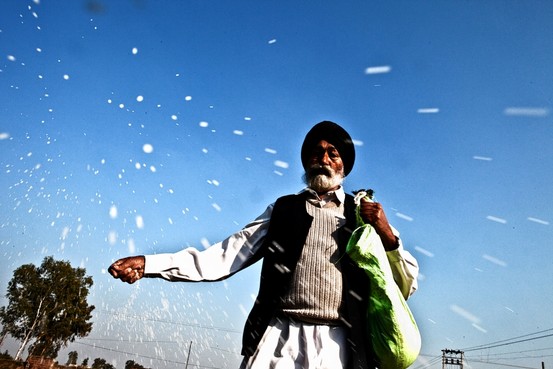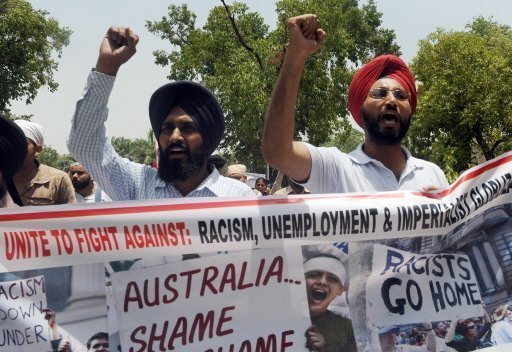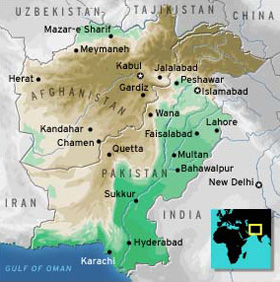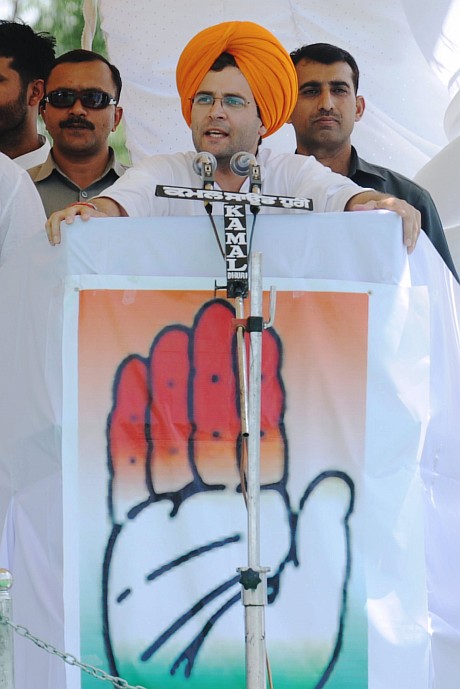
This week, the Wall Street Journal highlighted India’s decision to change some of its agricultural policies, in response to its  post-Green Revolution crisis. (Hat tip: Bandana)
post-Green Revolution crisis. (Hat tip: Bandana)
In the 1970s, India dramatically increased food production, finally allowing this giant country to feed itself. But government efforts to continue that miracle by encouraging farmers to use fertilizers have backfired, forcing the country to expand its reliance on imported food. [WSJ]
Kamaljit Singh, a 55 year old from Marauli Kalan in Punjab, explained:
He says farmers feel stuck. “The soil health is deteriorating, but we don’t know how to make it better,” he says. “As the fertility of the soil is declining, more fertilizer is required.” [WSJ]
Behind the worsening health of the soil is India’s agricultural policy. In it’s effort to boost food production, win farmer votes and encourage the domestic fertilizer industry, the government increased its subsidy of urea over the years, and now pays about half of the domestic industry’s cost of production.
We know there is a sizable Sikh population in Pakistan, despite many Sikhs who were forced to migrate to India during partition. In 2008, the Pakistani Sikh Anand Marriage Act was passed in Pakistani, which allowed Sikhs in their marriage certificates as Sikhs. Currently in India, Sikhs are identified as Hindus in marriage certificates.
Interestingly, I came across this music video by Jassi Singh Lailpura (i.e. Jasbir Singh) , a Pakistani Sikh.
He also gave an interview on a morning Pakistani television show where he talked more abut his music and life. Lailpura believes that a Pakistani is not defined by a religion or race, but by someone who believes it to be their country. It is obvious from the interview that he is a proud Punjabi Sikh from Pakistan. He talks about the impact of Partition on a Sikh woman. You can watch his interview below.

 The events following the June elections in Iran continue to reverberate. The allegations of widespread election fraud led to hundreds of thousands of Iranian youth to take to the streets and asking “Where’s My Vote?”
The events following the June elections in Iran continue to reverberate. The allegations of widespread election fraud led to hundreds of thousands of Iranian youth to take to the streets and asking “Where’s My Vote?”
A regime unable to answer its citizenry and an escalating use of repressive tactics has led many to begin questioning the legitimacy of the government. Born out of a revolution in 1979, a generation has grown up on legitimizing the current regime through understanding of the tyranny of the Shah’s. However, the tactics unleashed in the wake of the elections has shifted the public from asking about votes to calling for the ouster of the Supreme Leader. Khamenei has none other to blame than himself through his partisanship in siding with Ahmadinejad, rather than standing above the fray.
I found this video of the Miss World Punjaban 2008 contest interesting because the contestant chose to highlight her Sikh identity that is intimately linked to Punjabi culture. I find that it is easy for us to “intellectually” talk about the separation of the two identities. However, for many, being Sikh and Punjabi are intimately connected. They mutually exist-one does not envision oneself without the other.
Ms. Gurpreet Kaur Khaira from Canada chose to highlight this co-existence of the two identities in the talent portion of the contest. She performs dhadi vaar, while wearing a simple white suit and kessari chunni.
Who is Miss Punjaban and what does she look like varies … there is not only one notion of Punjabi “beauty” or identity … at least in this beauty contest! You can sing dhadhi vaar in simplicity or a Punjabi song in a bright red chunni and kokaa.
(FAST-FORWARD TO 1:44 to see Ms. Gurpreet Kaur Khaira from Canada)

 A Sikh exchange student from Punjab became the 20th victim, this year, of a hate crime in Australia. His attackers attempted to rip off his turban and forcibly cut his hair. According to the AFP, this is the latest in a wave of attacks against desis in Australia.
A Sikh exchange student from Punjab became the 20th victim, this year, of a hate crime in Australia. His attackers attempted to rip off his turban and forcibly cut his hair. According to the AFP, this is the latest in a wave of attacks against desis in Australia.
These attacks have been the subject of public protest, both among university students in Australia, and among others in India. Australia has been under pressure to address these hate crimes, and has been deploying police while claiming that these attacks are uncommon. The sheer number, however, indicate a wider tension between victims of racial hatred and violence, and their attackers. The last attack on a desi student, for example, has left the victim comatose. While the Australian government denies that these are racist attacks, the particular nature of these incidents seem to contradict this position. Does this spate of violence, then, expose the seemier underbelly of Australian race relations?
As the economic down-turn leads to increased joblessness, many countries are paying immigrant workers to return to their home countries. Japan, Spain, and the Cezech Republic are paying immigrant workers to return home with the stipulation that they not migrate back to the aforementioned countries for an x-amount of years. Thus, freeing up jobs for citizens and creating a bandage solution to crime and homelessness-as if these issues are only an “immigrant problem”.
BBC’s “World Have Your Say” reported this week that Czech Republic is offering just under $1,000 per immigrant; the Spanish government has offered six months of unemployment benefits, around $18500; and Japan is offering $3,888 per Latino worker plus an additional $2,000 per dependent.
According to The Wall Street Journal, large numbers of immigrants are actually taking up the offers; however, some are choosing to bypass the pay-off. Many find that the money they borrowed to arrive in these countries far exceeds the amount being offered. It would be very difficult for them to return home and find jobs that would help them repay their loans-the very reason they immigrated abroad. Jobs at home don’t provide a reliable and sustainable source of income.
Ultimately, these “pay-offs” frame immigrants as the root cause of problems in foreign countries. Not only do immigrants take-away jobs from local citizens; in a declining economy their joblessness leads to crimes and homelessness. Once again, the scapegoat is immigrants. The Economist reports that paying off immigrants to return to their home countries is a temporary solution to deeper problems.
What do you think?
 Earlier this month I asked if the Taliban’s rising influence in Pakistan and their removal of Sikhs from the Swat Valley was a harbinger for more extreme religious persecution. This week, two articles caught my eye:
Earlier this month I asked if the Taliban’s rising influence in Pakistan and their removal of Sikhs from the Swat Valley was a harbinger for more extreme religious persecution. This week, two articles caught my eye:
The first depicted multi-religious protests in Kashmir over Pakistan’s inaction in the region. The second implied complicity between the Jawat-ud-dawa (JuD) and the Taliban to use “rescue aid” as a coercive tactic.
The use of “aid” to buy sympathy, garner political favor, or build political support is nothing new, and is described extensively in Machiavelli’s The Prince [source]. Similar concerns were raised in the wake of the Indonesian tsunami, when Muslim communities alleged that Christian aid organizations were forcibly converting orphaned children and the injured by withholding necessary aid. The extent, or veracity, of those allegations was relatively unknown/unquantifiable. Given the Taliban’s extensive campaign-based strategies, in addition to the narrow regional focus of its impact, it should be less difficult to quantify the JuD’s impact.
 Months ago, my fellow langa(w)r-iter asked a question “On Whose Watch?” when Russian tanks retaliated against Georgian incursions. However, and almost all of us here at TLH, I believe, fall into the trap of having an American filter in terms of the news we discuss and don’t discuss have certainly left out a human rights travesty much closer to South Asia – that of Sri Lanka.
Months ago, my fellow langa(w)r-iter asked a question “On Whose Watch?” when Russian tanks retaliated against Georgian incursions. However, and almost all of us here at TLH, I believe, fall into the trap of having an American filter in terms of the news we discuss and don’t discuss have certainly left out a human rights travesty much closer to South Asia – that of Sri Lanka.
Another Sikh writer, Amardeep of Sepiamutiny, recently wrote about the ongoing humanitarian crisis, but as most in the media, in his subsequent comments, takes a statist approach. I believe that many Sikhs, from their own perspectives on state-violence against non-state actors, take a more even-handed view.
The humanitarian crisis is on epic proportions. A recent article by Gareth Evans, president of the International Crisis Group, writes:
As the Sri Lankan army continues its assault on what is left of the separatist Liberation Tigers of Tamil Eelam (LTTE), tens of thousands of civilians remain trapped inside a shrinking conflict zone, at risk not only from the fighting but from starvation and lack of water and medical attention. Despite the government’s April 27 announcement that the military had been ordered to cease using air attacks, artillery, and other heavy weapons against remaining LTTE-held areas, such attacks have carried on with increased intensity.
The trapped civilians are not the only ones at risk. More than 170,000 who have managed to escape the worst of the fighting remain imprisoned in desperately overcrowded camps and medical centers. Scores are reported to have died after fleeing the conflict zone, and the military has been overwhelmed by the number of civilians flooding into reception areas.
Regardless of one’s opinion of the LTTE and their horrific tactics, I would hardly condone a terrorist state, whose own violence and discriminatory practices led many Tamils into the arms of Prabhakaran and others of the LTTE. The LTTE does/did represent the voice of many Tamils.
 Earlier this month, worldwide Human Rights organization Amnesty International released a news article on the plight of Sikh Massacre victims of 1984, still awaiting justice after 25 years. This came shortly after the Delhi Court delayed ruling on Jagdish Tytler, due to the CBI’s inability to produce enough evidence against him. Ramesh Gopalakrishnan, Amnesty International’s South Asia Researcher stated:
Earlier this month, worldwide Human Rights organization Amnesty International released a news article on the plight of Sikh Massacre victims of 1984, still awaiting justice after 25 years. This came shortly after the Delhi Court delayed ruling on Jagdish Tytler, due to the CBI’s inability to produce enough evidence against him. Ramesh Gopalakrishnan, Amnesty International’s South Asia Researcher stated:
“The fact that almost 3,000 people can be murdered without anyone being brought to justice is offensive to any notion of justice and should be an embarrassment to the Indian government.”
“For the Indian government to dismiss these cases due to lack of evidence is farcical. The various agencies responsible for carrying out the investigations failed to carry out the most cursory of tasks – including recording eyewitness and survivor statements.”
As troubling as it is to read this, I was pleased to find that Amnesty International had covered it at all. As many of know, AI, as well as other independent human rights groups and initiatives were either banned or prevented from conducting research in India in the late 1980’s and early 1990’s. It seems as though there is hope for an independent investigation on the 1984 anti-Sikh pogroms and perhaps the subsequent disappearances during the counter-insurgency.
Not so fast…in an un-related story, the Tribune reported that Amnesty International has decided to shut down its India operations. The decision is said to have been triggered by continued denial to the Amnesty International Foundation of the FCRA (Foreign Contribution Regulation Act) registration by the Government of India.
(more…)
Blogged: Amol Singh
 On the night of April 24, 1915, over 200 of Constantinople’s Armenian intellectual and civic leaders were taken from their homes and boarded upon trains headed eastward toward the city of Ankara. What followed over the next few months would be a concerted, systematic Ottoman project meant to eradicate the Armenian identity. Millions of Armenians, depicted by the state as dangerous Russian conspirators and hazardous to the security of the Ottoman Empire, were uprooted from their homes and marched across the Turkish desert. What transpired over the course of that summer was the raping, pillaging, and butchering of over a million people. Though the Ottoman forces might have failed in the complete liquidation of a people, genocide served as a near consolation prize.
On the night of April 24, 1915, over 200 of Constantinople’s Armenian intellectual and civic leaders were taken from their homes and boarded upon trains headed eastward toward the city of Ankara. What followed over the next few months would be a concerted, systematic Ottoman project meant to eradicate the Armenian identity. Millions of Armenians, depicted by the state as dangerous Russian conspirators and hazardous to the security of the Ottoman Empire, were uprooted from their homes and marched across the Turkish desert. What transpired over the course of that summer was the raping, pillaging, and butchering of over a million people. Though the Ottoman forces might have failed in the complete liquidation of a people, genocide served as a near consolation prize.
As April 24th approaches, Armenians around the world will gather as they have for the past 90+ years and demand that the Turkish state take responsibility for its actions. This summer, as Sikhs also embark on projects to mark the events of 1984, it seems hard to escape the fact that we too, are becoming part of a global collective searching for some sort of acceptance of the atrocities that have been done to us. This sharing of spaces by the world’s downtrodden is allowing for more nuanced perspectives of each atrocity. In this understanding, the 1915 Armenian genocide becomes not a yearlong campaign to annihilate Armenia, but rather a set of events concurrent with a larger Ottoman decades- long campaign meant to undermine Armenian existence. In this sphere, Operation Blue Star becomes not a plan to rid Harimander Sahib of radicals hijacking the Sikh identity, but rather another incident in a set of systematic attacks on Sikh sovereignty by the Indian Center.
In this mold, we are becoming participants in a unique Genocidees Anonymous of sorts, where the recognition of our tragedies becomes cast into a set of layered political demands.
 Sometimes some articles are too disturbing to not make a comment.
Sometimes some articles are too disturbing to not make a comment.
The word Mein Kampf immediately brings to mind Adolf Hitler’s deluded dream and genocidal paranoia of the “Jewish peril”. Long the Bible of idiotic Aryan supremacist groups, the book seems to have found a rather new (or maybe) old niche market in India.
Sales of Mein Kampf, Adolf Hitler’s autobiography and apologia for his anti-semitism, are soaring in India where business students regard the dictator as a management guru.
Booksellers told The Daily Telegraph that while it is regarded in most countries as a ‘Nazi Bible’, in India it is considered a management guide in the mould of Spencer Johnson’s “Who Moved My Cheese”.
Sales of the book over the last six months topped 10,000 in New Delhi alone, according to leading stores, who said it appeared to be becoming more popular with every year.
 With Obama’s move for a new strategy, recently, we have seen an avalanche of different articles from Af-Pak, the newly vogue name for the region. I will begin with some more macro-debates, before turning to the Sikh-specific.
With Obama’s move for a new strategy, recently, we have seen an avalanche of different articles from Af-Pak, the newly vogue name for the region. I will begin with some more macro-debates, before turning to the Sikh-specific.
An interesting analysis was recently featured in the London Review of Books, in an article titled ‘Taliban versus Taliban.’ In the article, the Economist correspondent, Graham Usher, notes that Americans have a problem in understanding the complexities of the “Taliban” phenomenon because it means different things to different people at different times.
All politics is local and that is how the Taliban should be treated as well. Made up of diverse factions and groups with widely separate ideologies, we “lump” them under a specific tag – “Taliban.” While for the US, anyone that attacks them in Afghanistan is Taliban, for the Pakistani Army, their perspective is a bit different. The only issue that really matters is if the group works in India’s strategic interest. Thus there are ‘good’ elements and ‘bad’ elements:
The short answer is pro-India, in practice if not intent. Insurgents in the tribal areas are deemed anti-Pakistani if their actions advance the perceived goals of India in Afghanistan. They are pro-Pakistani as long as they don’t attack the Pakistani state or army, even if they launch attacks against Nato forces in Afghanistan, Islamabad’s supposed allies in the ‘war on terror’. Indeed, the Afghan Taliban is considered an ‘asset’, a hedge against the day when the US and Nato leave, but also a counter to India’s expanding influence in Afghanistan.
 OR HOW NOT TO PULL A SIKH-RELATED PUBLICITY STUNT
OR HOW NOT TO PULL A SIKH-RELATED PUBLICITY STUNT
I will leave the PR-stunt by Congress heir-apparent, Rahul Gandhi, son of Rajiv Gandhi, grandson of Indira Gandhi, and great-grandson of Nehru and his ill-advised (or rather ill-positioned pagri) to speak for itself. A pictures is worth 1000 words and ‘ridiculous’ is one of those that come near the top for this election stop near Takht Damdama Sahib.
On a bit of a serious note, although I hate writing short posts without analysis, I came across a finely-written article about the ‘Shoe-hurling Sardar and Deep-rooted Sikh Grievances‘ published in a Pakistani newspaper that I wanted to bring to our readers’ attention.
I initially cringed when I read stereotypical sentences, such as:
However, Sikhs are known for their forthrightness and carrying a level head in emotionally charged situations is not one of their strengths.
Eventually I got over it and just focused on the substance of the matter. Definitely worth a read.
 Last week, the International Criminal Court (ICC), issued an arrest warrant for current President of Sudan, Omer Hassan Al-Bashir. Al-Bashir has been charged with five counts of crimes against humanity: murder, extermination, forcible transfer, torture and rape. He also faces two counts of war crimes. The ICC may be growing its first tooth.
Last week, the International Criminal Court (ICC), issued an arrest warrant for current President of Sudan, Omer Hassan Al-Bashir. Al-Bashir has been charged with five counts of crimes against humanity: murder, extermination, forcible transfer, torture and rape. He also faces two counts of war crimes. The ICC may be growing its first tooth.
Behind the warrant were the many groups that have tirelessly worked to bring global attention to the matter. The ‘Save Darfur’ campaign has been extremely successful example in rallying public support, beginning in churches and university campuses, to influence the public dialogue and bring pressure upon public officials. Through organizing local events, but aiming to influence public opinion on a global level, the campaign is a model in their use of new media, internet, and public rallies and theatre to bring attention to the genocide and plight of a people. While I am in admiration of the campaigns strategies and efforts, it is still worthwhile to ponder on global culpability in allowing such genocides to continue to occur.
As part of these efforts, the campaign has been successful in bringing pressure upon China for its continued support of the genocidal regime and its willingness to condone the Sudanese government’s behavior in its bid to keep receiving returns on its billions of dollars investment into the country’s oil industry. Although on some level I understand realpolitik and China’s strategy of attempting to find oil supplies in those states that are considered pariahs by the US in order for China to satiate its growing oil needs. Still I cannot condone such actions and cannot trade human life for oil.
Grassroots efforts and political efforts are starting to show that the pressure upon China for its support of Sudan is beginning to have effect. Steven Spielberg’s boycott of the Beijing Olympics was one example. Protecting Sudan through its veto ability in the Security Council of the United Nations (UN), it is understandable why world pressure focuses on China. It is heartening that the pressure may even be beginning to have some effect.
However, left out of the equation is India.
We have often heard about the Sikh regiment in the British and Indian Armies. Recently, the Gurkhas, a South Asian group, who also has made-up a large portion of the British Army, are seeing a U-turn in an earlier policy that did not allow Gurkhas soldiers to settle in Great Britain.
The Tribune reports:
In a U-turn of its earlier policy, Britain is set to allow an estimated 36,000 Gurkhas who served in the British Army before 1997 and their families to settle here, conceding a long-pending demand by the former soldiers.
The home office was forced to take action after a ruling from high court judges in October that the government needed to review its policy on whether the Gurkhas who had served the army before 1997 — the year Hong Kong was handed over to China — could live in Britain.
However, the Nepalese government is concerned about the loss of so many soldiers and their families along with their army pensions, that they have warned the Home office that, “ … Nepal might scrap the 1947 agreement under which its young men have been recruited each year” to serve in the British Army. Since the signing of the agreement, the Nepalese economy has heavily relied on the army income.
Monday marked notable achievements in the human rights world, for Sikhs affected by the Indian government’s abuses in Punjab in the 80s and 90s, as well as in the arena of international criminal justice.
First, Ensaaf recently partnered with Benetech, a technology organization that has created data analysis software to measure whether documented human rights abuses occurred on a systematic, widespread scale or whether they were arbitrary. On Monday, Ensaaf and Benetech’s Human Rights Data Analysis Group (HRDAG) released their findings.
The report by Ensaaf and HRDAG, Violent Deaths and Enforced Disappearances During the Counterinsurgency in Punjab, India, presents empirical findings suggesting that the intensification of counterinsurgen
cy operations in Punjab in the early 1990s was accompanied by a shift in state violence from targeted lethal human rights violations to systematic enforced disappearances and extrajudicial executions, accompanied by mass “illegal cremations.” Indian security officials have dismissed claims of human rights violations as unavoidable “aberrations” during the counterinsurgency against alleged terrorists in Punjab from 1984 to 1995.
“This report challenges explanations by Indian security forces for enforced disappearances and extrajudicial executions using more than 20,000 records from independent sources which have been analyzed using statistical methods,” said Romesh Silva, a demographer at HRDAG and co-author of the report. “This scientific analysis reveals that answers given by the government regarding the nature and extent of these violations are implausible given the available evidence. The victims and their families have a right to the truth.” [ensaaf]
 This holiday season I noticed the pinched expressions on people’s faces, the emptier stores, the going out of business sales, and the general air of unease and uncertainty as we round out of the holiday season and into a worsening (economically) new year.
This holiday season I noticed the pinched expressions on people’s faces, the emptier stores, the going out of business sales, and the general air of unease and uncertainty as we round out of the holiday season and into a worsening (economically) new year.
Over the past few weeks, the NYT has been covering how the recession has impacted small businesses, which tend to operate under situations that make them more sensitive to the need for liquidity than larger corporations.
Even companies…, whose products and services are in demand, are being ensnared in the deepening recession…
Some 60 to 80 percent of new jobs [in the U.S.] come from small businesses, Mr. Keating said, and more than 50 percent of private sector gross domestic product is created by small business. [link]
The damage, however, is not just localized. As the slowdown in the U.S. economy drags other world economies down, slow times have also impacted small business owners in immigrant communities, including Vancouver’s Punjabi Market:
“I don’t see much of a future here,” said Virani, who is considering closing her shop.She isn’t alone. At least 10 storefronts between 48th and 51st avenues are papered over and displaying For Rent signs.
Barack Hussein Obama’s historic victory as the 44th President of the United States Of America is being celebrated not only in America, but across the world.
He said in his victory speech that:
This victory alone is not the change we seek. It is only the chance for us to make that change. And that cannot happen if we go back to the way things were.
It can’t happen without you, without a new spirit of service, a new spirit of sacrifice.
So let us summon a new spirit of patriotism, of responsibility, where each of us resolves to pitch in and work harder and look after not only ourselves but each other.
Thus, I leave you with a BBC news clip on how the World is reacting to Obama’s win. As people celebrate across the world, they also offer what they believe this “chance” for “change” means for American foreign relations!

